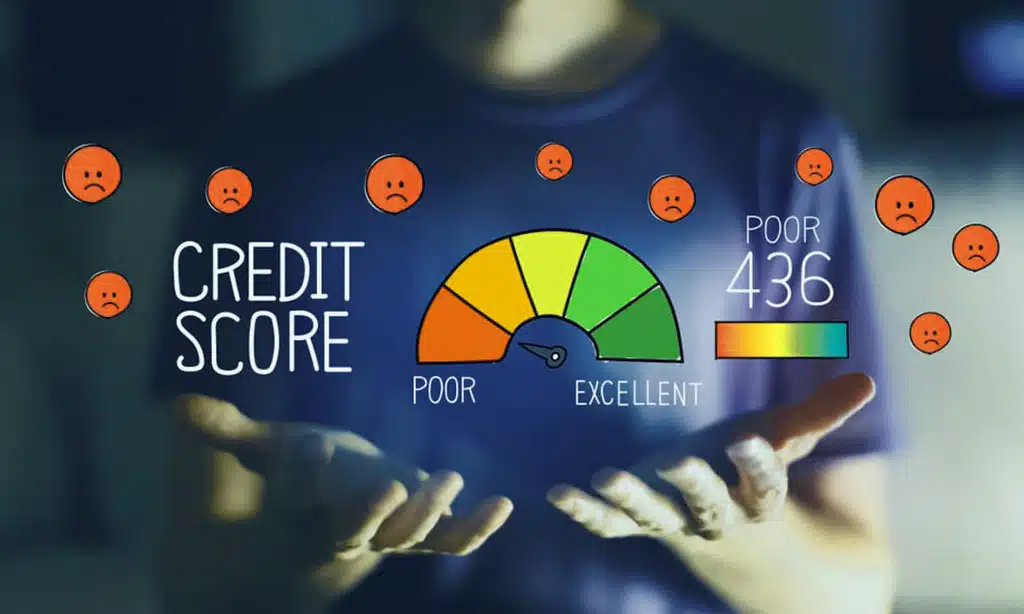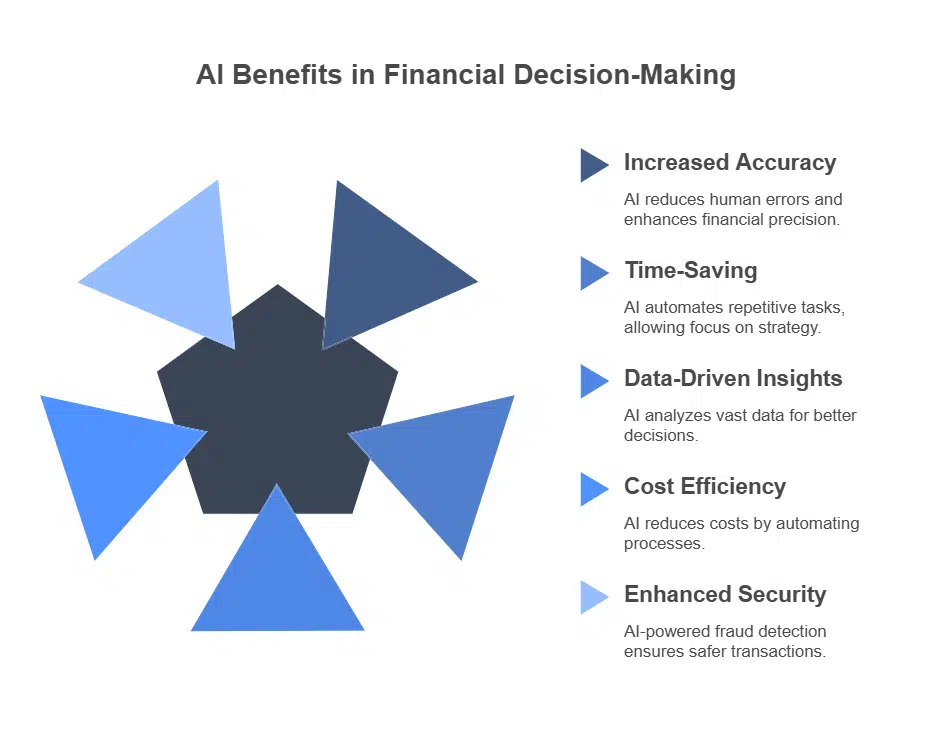In today’s fast-paced financial landscape, AI-powered tools for financial decision-making are revolutionizing the way individuals and businesses manage their money. From investment strategies to fraud detection, artificial intelligence [AI] is empowering users with data-driven insights, automation, and predictive analytics.
This article explores five AI-powered tools for financial decision-making, highlighting their benefits, functionalities, and real-world applications.
Whether you’re an investor, business owner, or financial planner, leveraging AI in financial decision-making can lead to smarter, more accurate, and efficient outcomes.
How AI is Transforming Financial Decision-Making
AI is reshaping the financial industry by introducing automation, data analysis, and predictive modeling. Here’s how AI is making an impact:
- Predictive Analytics: AI uses historical data to forecast financial trends, helping investors make informed decisions.
- Risk Assessment: AI-driven risk models evaluate potential financial risks with higher accuracy than traditional methods.
- Automated Processes: AI streamlines financial workflows, reducing manual errors and improving efficiency.
- Fraud Detection: AI algorithms identify suspicious activities and enhance security measures.
- Personalized Financial Advice: AI-powered chatbots and advisors offer tailored recommendations based on user data.
5 AI-Powered Tools for Enhancing Financial Decision-Making
AI-powered tools for financial decision-making are reshaping the financial industry by providing automation, real-time insights, and data-driven strategies. These tools help investors, businesses, and individuals make smarter, more informed choices while minimizing risks and maximizing efficiency.
1. AI-Based Investment Platforms
AI-based investment platforms are transforming the way people manage their portfolios. These platforms use machine learning algorithms to analyze market trends, assess risks, and execute trades with minimal human intervention. By processing vast amounts of financial data in real-time, AI-powered investment platforms can detect patterns that human analysts might miss, allowing for more precise predictions and strategic investment decisions.
Additionally, they offer personalized investment recommendations based on user preferences, financial goals, and risk tolerance, making them valuable tools for both seasoned investors and beginners looking to optimize their portfolios.
Features of AI Investment Tools:
- Real-time market analysis for precise decision-making.
- Automated portfolio rebalancing to optimize investments.
- Risk management algorithms to minimize potential losses.
- AI-powered trading bots for executing trades at optimal times.
Best AI Investment Platforms:
| Platform | Key Features |
| Betterment | Automated portfolio management, tax-loss harvesting |
| Wealthfront | AI-driven financial planning, smart investing strategies |
| Robinhood AI | AI-based trading insights and risk assessment |
| Q.ai | AI-powered investment portfolios tailored to user preferences |
2. AI-Driven Budgeting and Expense Management
AI-driven budgeting tools help individuals and businesses track expenses, predict future financial trends, and optimize spending habits. These tools use machine learning to analyze spending patterns, categorize expenses, and provide insights on where money is being allocated.
By leveraging AI-powered recommendations, users can set realistic budgets, reduce unnecessary expenses, and develop better financial habits. Additionally, these tools integrate with banking and payment systems to offer real-time financial updates and automate savings strategies, making money management more intuitive and efficient.
How AI Helps in Budgeting:
- Smart categorization of expenses for better financial organization.
- Predictive cash flow analysis to anticipate future financial needs.
- Automated bill payments and reminders to prevent missed payments.
- AI-powered savings recommendations based on spending patterns.
Top AI Budgeting Tools:
| Tool | Features |
| Mint | AI-powered expense tracking, personalized financial advice |
| YNAB [You Need A Budget] | AI-driven budgeting framework, debt payoff strategies |
| Cleo | AI chatbot-based financial assistant, savings automation |
| PocketGuard | AI-based spending analysis, bill tracking, fraud detection |
3. AI-Powered Credit Scoring and Risk Analysis
Financial institutions rely on AI to assess creditworthiness and predict loan risks more accurately than traditional methods. By leveraging machine learning and big data analytics, AI evaluates an applicant’s financial behavior, transaction history, and alternative data sources such as online activity and spending patterns.
This advanced approach enables lenders to make faster, fairer, and more precise lending decisions, reducing the risk of defaults while expanding financial inclusion. Additionally, AI-driven credit scoring models continuously improve by learning from new data, ensuring that lending assessments remain up-to-date and effective.
Benefits of AI in Credit Scoring:
- Real-time credit evaluation using machine learning algorithms.
- Alternative data analysis [social media behavior, online transactions] for better scoring.
- Fairer lending decisions by reducing human biases.
Leading AI Credit Analysis Tools:
| Tool | Features |
| Upstart | AI-driven loan approval, risk-based pricing |
| ZestFinance | AI-powered underwriting, alternative data analysis |
| FICO Score X | Machine learning-based credit risk evaluation |
| LenddoEFL | AI-based financial inclusion scoring for emerging markets |
4. AI for Fraud Detection and Prevention
Financial fraud is a growing concern, and AI-powered tools are crucial for detecting and preventing fraudulent activities. With the rise of digital transactions, cybercriminals are developing more sophisticated methods to exploit vulnerabilities in financial systems.
AI-driven fraud detection solutions use machine learning and real-time data analysis to identify suspicious patterns, flag unusual activities, and prevent unauthorized transactions before they cause financial damage. These tools enhance security for banks, businesses, and individuals by continuously learning from new threats and adapting their algorithms to stay ahead of evolving fraud tactics.
How AI Detects Fraud:
- Real-time anomaly detection in financial transactions.
- Behavioral analytics to spot suspicious user activity.
- Automated alerts to prevent fraudulent transactions before they occur.
Best AI Fraud Detection Tools:
| Tool | Features |
| Darktrace | AI-driven cybersecurity, real-time fraud detection |
| Feedzai | AI-based risk management, payment fraud prevention |
| FICO Falcon | Machine learning fraud detection, transaction monitoring |
| Kount | AI-powered identity verification, fraud prevention |
5. AI-Powered Financial Chatbots and Advisory Services
AI chatbots and virtual financial advisors are becoming increasingly popular for providing instant, data-driven financial guidance. These intelligent assistants leverage machine learning and natural language processing [NLP] to analyze user queries, deliver personalized financial insights, and streamline decision-making processes.
By offering round-the-clock assistance, AI-powered chatbots help users manage budgets, track expenses, and even provide investment advice, making financial planning more accessible and efficient.
Role of AI Chatbots in Finance:
- 24/7 financial assistance for banking and investment queries.
- Personalized financial recommendations based on user behavior.
- Automated customer service to improve user experience.
Top AI Financial Advisory Tools:
| Tool | Features |
| Erica [Bank of America] | AI-driven financial insights, spending analysis |
| Cleo | AI-powered budgeting and savings assistant |
| Eno [Capital One] | AI chatbot for expense tracking, transaction alerts |
| Pefin | AI-based personal financial planning |
Key Benefits of Using AI in Financial Decision-Making
- Increased Accuracy: AI reduces human errors and enhances financial precision.
- Time-Saving: AI automates repetitive financial tasks, allowing users to focus on strategy.
- Data-Driven Insights: AI tools analyze vast amounts of financial data for better decision-making.
- Cost Efficiency: AI reduces operational costs by automating complex financial processes.
- Enhanced Security: AI-powered fraud detection ensures safer financial transactions.
Challenges and Limitations of AI in Finance
- Data Privacy Concerns: AI systems require access to vast amounts of sensitive financial data.
- Regulatory Compliance: Financial institutions must navigate AI-related regulations.
- Over-Reliance on AI: AI should complement, not replace, human financial expertise.
- Bias in AI Algorithms: AI models can inherit biases from training data, impacting fairness.
Future of AI in Financial Decision-Making
- Growth of Decentralized Finance [DeFi]: AI will enhance DeFi applications, improving efficiency and security.
- AI in Personalized Financial Planning: Future AI tools will offer hyper-personalized investment strategies.
- Expansion of AI in Risk Management: AI will further refine financial risk assessments.
- AI-Driven Robo-Advisors: Advancements in AI will make robo-advisors more intelligent and accessible.
Takeaways
The integration of AI-powered tools for financial decision-making is transforming the finance industry, making processes smarter, faster, and more efficient. Whether it’s AI-driven investment platforms, budgeting tools, fraud detection, credit analysis, or financial chatbots, these technologies are enhancing financial decision-making at every level.
As AI continues to evolve, businesses and individuals should embrace these innovations to stay ahead in the financial landscape. By leveraging AI-powered financial tools, you can make data-driven decisions that lead to long-term financial success.







































